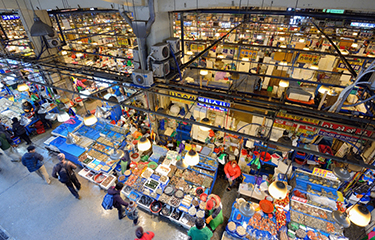Some Norwegian seafood producers have been severely affected by the loss of the restaurant trade globally, but the industry as a whole has so far proved adaptable during the COVID-19 coronavirus crisis, according to the Norwegian Seafood Council (NSC).
In its latest coronavirus update, the NSC said that the demand for Norwegian seafood is likely to be impacted in several markets by increased uncertainty among consumers about their future purchasing power, but it also asserted that history reveals a silver lining for the salmon sector, as at-home consumption of salmon increased during the global financial crisis in 2008.
“In several of our most important export markets, we have been told of episodes of supermarket hoarding and thus growth in retail sales. This growth is expected to slow as people eat the produce they have purchased. As the situation stands now, we can nonetheless expect that retail will remain strong, as people are eating at home rather in restaurants,” NSC analyst Paul Aandahl said.
Norway’s salmon exports decreased by 3.6 percent in volume terms in week 12 compared with a year previously. For fresh whole salmon the reduction was 8 percent, while fresh fillet exports increased by 28 percent. Frozen salmon fillet exports increased by 17 percent compared to the corresponding week of 2019.
“The Norwegian seafood industry has proven itself agile and adaptable in the face of the current challenges and has turned their production towards more processed products. [While] the export of fresh whole salmon to the E.U. has fallen by 6 percent in week 12, we see growth of 16 and 63 percent respectively to Poland and Lithuania,” Aandahl said. “These are markets where Norwegian salmon are processed and smoked before being sold to European markets.”
Aandahl added that exports to Asia ended up being relatively similar numbers in certain products compared with 2019.
“Despite a sharp decline in the sales of Norwegian salmon to the restaurant segment in Asia, the total volumes of fresh whole salmon to Asia were almost the same as last year. This is primarily because of strong growth in the take-away segment and increased sales in retail,” he said. “China had a decline of 17 percent compared with last year, however, in South Korea exports have grown by 53 percent.”
That story was largely the same in the U.S., where some exports saw decreases while other remained stable.
“To the U.S. market, where transport capacity for fresh salmon was severely affected in week 12, fresh Norwegian salmon exports fell by 89 percent, while fresh fillet exports remained at the same level.”
The demand for fresh Norwegian whitefish also continued to decline in week 12, with 29 percent less cod and 15 percent less whole skrei exported than in the corresponding week of 2019. However, NSC analyst Ingrid Kristine Pettersen explained that there had been significant growth in frozen whole cod and clipfish exports in line with the rising demand for products with longer sell-by dates.
"There is still a price growth in Norwegian kroner for all cod products, but both in euros and U.S. dollars there is a significant price drop, especially for fresh whole cod and skrei," she said.
NSC’s update also warned the closure of the United Kingdom’s 10,000 fish-and-chip shops last week will have an impact Norway’s whitefish trade.
“Importers and distributors into this segment are affected by this and we are likely to see a fall in exports to this part of the market. The restaurant market is now also completely gone, which has consequences for Norwegian salmon and Norwegian fresh whitefish," NSC U.K. Director Hans Frode Kielland Asmyhr said.
Norway’s seafood industry exported 1.1 million MT of salmon and 181,000 MT of cod in 2019.
Photo courtesy of ESB Professional/Shutterstock







